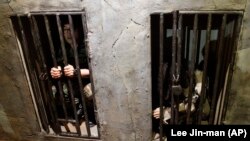The international community has been rightly concerned over the threats to international peace and security posed by the Democratic People’s Republic of Korea, including the launch of ballistic missiles; preparations for a nuclear test; and cyber-attacks against crypto-currency infrastructure that fund their weapons of mass destruction programs.
But 31 countries, including the United States, Japan, the Republic of Korea, and dozens of other nations across the globe, recently turned their attention to the deplorable human rights abuses suffered by those living in the DPRK, and they issued a joint statement on the matter. U.S. Ambassador to the United Nations Linda Thomas-Greenfield delivered the joint statement following a closed-door UN Security Council meeting.
On behalf of the 31 countries, Ambassador Linda Thomas-Greenfield noted that the DPRK government is “one of the worst violators” of human rights in the world. More than 100,000 people are held in political prison camps where they suffer violations including torture, forced labor, summary executions, starvation, and gender-based violence.
“Those not in political prison camps are refused fundamental human rights, including the freedom of expression, information and even freedom of thought,” she stated.
Citizens from other countries have also suffered abuses, including summary executions, assassinations, surveillance, intimidation, abductions and forced repatriation. On behalf of her fellow representatives, Ambassador Thomas-Greenfield expressed particular concern with the human rights situation of citizens of the Republic of Korea detained in the DPRK; abductions and enforced disappearances of Japanese and Republic of Korea citizens; and unrepatriated prisoners of war.
The statement by the 31 representatives noted that the regime’s ongoing human rights violations “are inextricably linked with the country’s unlawful and destabilizing weapons program.” The coercive system of the regime diverts resources to weapons development, even as the North Korean citizens suffer from severe economic hardship and malnutrition.
“The modern world has no place for such brutality. We commend and support all efforts to hold perpetrators accountable,” the representatives stated.
“These human rights violations threaten international peace and security, and it is time for the Council to address it publicly. We urge all Security Council members to support an open briefing in 2023 where we can discuss the human rights violations and abuses committed by the DPRK, the implications for peace and security, and explore ways to incorporate human rights into the peace and security diplomacy in the Korean Peninsula.”






